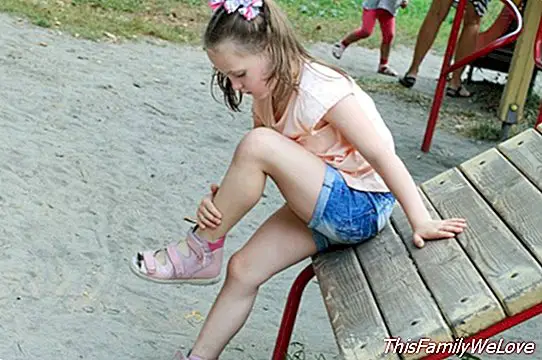Why do your children need to fall?
Many times we go to the park and hear: "Do not run, you're going to fall!" "Beware that you may stumble!", And the best thing is that many times we are the ones who repeat it frequently to our children without realizing that of the falls you also learn.
Parents are frightened by any tripping or falling on the floor of children. We do not want injuries or scratches done. Y we see dangers in activities as normal as climbing a park structure, running, or jumping from "very" high.
Other parents fear that if their child falls down they will be afraid to do the same activity again and do not want to ride a bike or jump down the slide again, underestimating the desire to overcome their children.
You have to be cautious, but without going too far
All parents want our children to be safe adults, with confidence in their possibilities, capable of taking risks and making decisions. And this process begins in childhood. How? We must give them security, let them do difficult things and let them fall too.
Because children need to hurt themselves. They need to try new things. They need to develop their muscles and test their balance system, etc. climbing, jumping, climbing, running, balancing ... Even more: they need to see that they are capable of facing challenges and surpassing themselves. It is a lifelong learning.
The important thing is not the fall, but how you get up

It is important for children to fall, hurt themselves, cry and get up (with your help if necessary). Because in life they will fall thousands of times and they have to learn to get up and continue living. That's right: you have to know what the limits are, that is, you should not take unnecessary risks or learn to live to the limit. We can not put a 2 year old to climb Everest!
If you ever doubt your child's abilities, these three clues can be when you're not sure if an activity is appropriate for your child's age or not:
1. Look at the rest of the children who are doing the same thing: If you see that everyone is older than 8 and you have a 3-year-old baby then it may not be a good idea for your child to do so. But if you see other children of your age, go ahead and try!
2. Think about what is the worst that can happen: Sometimes we are afraid that our child will fall, but what can happen if he falls? Maybe a knee injury is done. So no problem! You can comfort him and just say: "What a wound you have done to yourself! That makes you stronger." And it is true, because with a wound they learn what pain is, they learn that wounds heal, and next time they will know what to expect from a fall. It also teaches them to be more cautious.
3. Do things you can do alone: If you let your child do anything he does not need help for, the most normal thing is that there is no danger. If your child can go up and down a tree without help, it is normal that nothing happens to him. If instead you have to be holding and pushing ... then you may have to wait until you are taller or older to undertake this challenge.
A tip for parents of girls
Girls are NOT more fragile than children. Girls do NOT fall more than children. Girls are NOT less agile, less fast, less physically capable than children. We are the parents who make them like that, because we are more afraid that a girl will fall! If you have daughters encourage them to undertake challenges, to do difficult things, to make an effort, to climb, to run, to jump ... You will be giving them confidence in themselves, and they will be strong and safe both physically and emotionally.
Amaya de Miguel. Parent mentor and founder of Relax and educate




